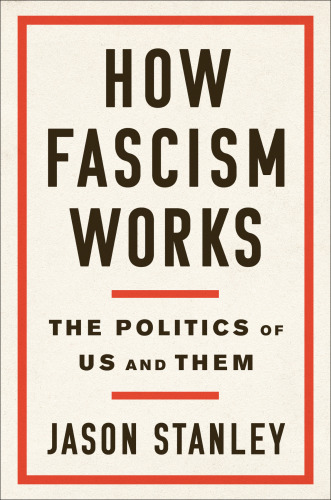
How Fascism Works
The Politics of Us and Them
کتاب های مرتبط
- اطلاعات
- نقد و بررسی
- دیدگاه کاربران
نقد و بررسی

April 15, 2018
Award-winning Yale philosophy professor Stanley (How Propaganda Works) understands fascism intuitively: his parents were refugees from World War II Europe. Worrying about today's fractured political arena, he argues that countries can have fascist strains without being fascistic. Fascism means dividing a population to achieve power and, he says, has ten "pillars": the mythic past, propaganda, anti-intellectualism, unreality, hierarchy, victimhood, law and order, sexual anxiety, appeals to the heartland, and a dismantling of public welfare and unity. Keep your eyes peeled.
Copyright 2018 Library Journal, LLC Used with permission.

June 15, 2018
A philosopher examines political tactics that give rise to fascism.The son of immigrants who fled Nazi Germany, Stanley (Philosophy/Yale Univ.; How Propaganda Works, 2015, etc.) has directly observed the consequences of fascism. Troubled that fascist politics is on the rise throughout the world, he offers an analysis of the many strategies that fascist regimes employ: publicizing the idea of a mythic past, use of propaganda and conspiracy theories, anti-intellectualism, the replacement of "reasoned debate with fear and anger," casting doubt on the media, denial of equality and insistence on a hierarchy legitimized by nature (e.g., whites being superior to nonwhites), propagation of a culture of victimhood, campaigns based on law and order, incitement of male sexual anxiety, appeals to rural voters and suspicion of cosmopolitan urban dwellers, and perpetuation of a national conflict between "us" and "them," based on ethnic, religious, and racial identities. Like Madeleine Albright and Timothy Snyder in their recent books, Stanley sees fascism threatening democracies, not least in the United States, where Donald Trump has all the earmarks of a fascist leader. Drawing on research by sociologists, philosophers, and other scholars--as well as sources such as his grandmother's memoir of Nazi Germany and Mein Kampf-- Stanley argues convincingly that fascists employ "legitimation myths" to promote their ideas, exploiting, for example, "a human tendency to organize society hierarchically" to justify the idea that "the principle of equality is a denial of natural law." Fascists foment the distinction between "us" and "them" by using specific coded language, which psychologists call Linguistic Intergroup Bias, to describe individuals' actions. Using the term "criminal" to describe murder, traffic violations, and political protest "changes attitudes and shapes policy." Fascists stir up suspicion of intellectuals by presenting "liberal tolerance" as synonymous with "elite privilege." Stanley also rightly worries about complacency: Many of his grandmother's friends and neighbors refused to acknowledge the Nazi threat until it was too late; today, the "normalization of extreme policies" poses an urgent challenge.A potent call for democracies to resist the insidious encroachment of fascism.
COPYRIGHT(2018) Kirkus Reviews, ALL RIGHTS RESERVED.

July 16, 2018
Stanley (How Propaganda Works), a Yale philosophy professor, delivers an instructive and poignant examination of fascism—a resurgent presence in both developed and developing nations, including the United States—in this cogent and accessibly written book. He cites past and present examples of fascist behavior from politicians—from Hitler, Nazi propagandist Joseph Goebbels, and Benito Mussolini to Turkey’s Recep Tayyip Erdogan, Vladimir Putin, and Donald Trump—and draws on sociology and critical race theory to identify 10 concepts and tools employed by political leaders to promote a fascist politics that rely on an “us-versus-them” mentality. Liberal democracies, he writes, have seen immigrants, refugees, and city dwellers, among others, treated as “them.” The 10 tactics, which include propaganda, anti-intellectualism, and “victimhood,” will be eerily familiar to observers of today’s political landscape; for example, the Trump administration’s rhetoric surrounding the media is recalled by Stanley’s statement that “Reality itself is cast into doubt.... Fascist politics exchanges reality for the pronouncements of a single individual, or perhaps a political party.” Stanley is an erudite guide, and his convincing analysis of forces at work in present-day politics is accessible to experts and novices alike. Agent: Stephanie Steiker, Regal Hoffman & Assoc.

























دیدگاه کاربران